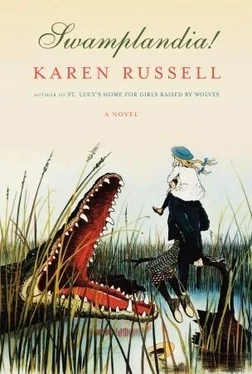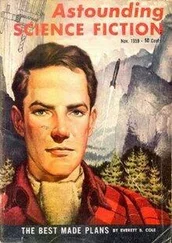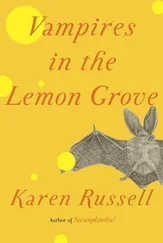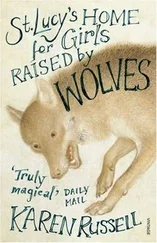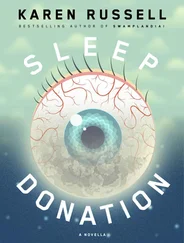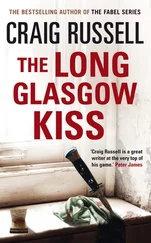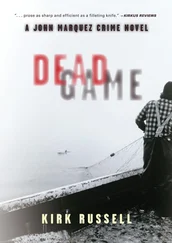“Dad, I just …”
“Listen: your sis has a bad case of lovesickness. For a girl her age, that’s like the common cold. A case of the sniffles.” As if to prove his point, he made a gulping noise in his own throat. I noticed that our dad wasn’t looking at us. “It’ll pass.”
“Lovesickness?” Now it was my turn to gape at him.
“Sure,” the Chief said. “Puppy love. You’re both readers, eh? Study up on Romeo. You can’t forbid love to anybody. Forbidding is just stoking the flames. You can’t boss love, kids.”
The Chief pushed away from the table; I think he was trying his best not to yell at us. He put his fiery heron headdress on the countertop, next to the blue box of corn cereal; he opened the two faucets. Then he dropped to his knees under the twin gushers to fix the kitchen plumbing. We stayed to watch. Just a bad leak, he grunted. When the cabinet doors opened, we could actually smell the rank, strawberry-colored puddles of water. We could see around the Chief’s head to tiny cairns of mouse turds.
“How’s that look up there, Ava?”
Some of the pipes had turned iron red and his voice sounded hollow in that cavity. Kiwi gave it a last shot:
“Chief? Did you hear us, Dad? These guys she’s dating — they’re dead.”
“Yes,” the Chief sighed. “Yes, I’ll admit, that is a little peculiar.”
* * *
The Chief’s efforts at normalcy began to make me feel many inexplicable things, like anger and sorrow and a peculiar self-loathing. Shame on me, I mean really on top of me, as slick and endless as a sweat. This shame was a weird alloy, but after a while I didn’t even mind it — it was like a sword I’d made, glinting and strong. If I didn’t hate myself, I had a feeling that I’d start hating him, my dad. Whenever I came across the Chief mucking out the Gator Pit, holding the little accordion trunk of the submersible pump above the algae, all alone, without Grandpa or Mom or help of any kind, my whole belly tightened.
Once I asked my father, “Chief, why are you hosing the stage when the stadium is empty? Why bother getting dressed at all, for nobody?”
“Well, my kids are hardly ‘nobodies,’ Ava,” he’d chuckled, like we were this great comedy team. “My kids are not some mainland twerps — they are the finest wrestlers in America!” It was a scary comedy. Sometimes we’d try to clown around in the old way and I’d get a feeling like invisible pies dripping down both our faces.
Some team! The Chief was doing so many jobs alone. I’d fix on the Chief’s raw, rope-burned palms or all the gray hairs collected in his sink, and I’d suffer this terrible side pain that Kiwi said was probably an ulcer and Ossie diagnosed as lovesickness. Or rather a nausea produced by the “black fruit” of love — a terror that sprouted out of your love for someone like rotting oranges on a tree branch. Osceola knew all about this black fruit, she said, because she’d grown it for our mother, our father, Grandpa Sawtooth, even me and Kiwi. Loving a ghost was different, she explained — that kind of love was a bare branch. I pictured this branch curving inside my sister: something leafless and complete, elephantine, like a white tusk. No rot, she was saying, no fruit. You couldn’t lose a ghost to death.
She showed me a diagram in The Spiritist’s Telegraph , part of a chapter entitled “The Corporeal Orchard.” I’ve never forgotten it. It had a punctilious, surgical level of detail, like one of Leonardo da Vinci’s anatomical sketches — only in this drawing the aortas and ventricles of a human heart burst into flowering trees.
“Gross, Os. You think there’s a rotten fruit stuck inside me?” I touched a rib, horrified but also filling with a sort of dark self-regard.
“Not exactly. You’re scared. See? You’re angry because you think the Chief is going to die, too.”
“Huh? No I don’t!”
“You’re angry at him but it’s too early, Ava.”
“Never mind.” I frowned. Ossie thought she was so smart now that she’d read one book. Black fruit, how stupid can you get! “You know what, I think Kiwi is right.” I lifted the dirty stripes of my Swamplandia! T-shirt and scowled at my belly. “It feels more like an ulcer.”
But I couldn’t shake the image, crates and crates of sunken black oranges. My heart gone wormy and rotten with fear. I thought of the corporeal orchard whenever I saw the Chief’s face.
It was around this time that I developed a weird fascination with the tiny cockroaches that had overtaken our café. I’d see them marching around the perimeter and I’d feel a little twinge; I imagined a weird kinship between us. Their skeletons were flipped outward into hard mirrors, but inside, all jelly. They tapped and tapped at each other’s backs. I’d get unaccountably sad some nights, just watching this little blind ballet go tickling up the walls. Kiwi noticed my creepy new interest and tried to encourage it with a book he’d found on the Library Boat called Why Insects Amaze Us .
On Saturdays the Chief continued to hold rehearsals for the two of us. This was a gift from my father to me, probably one of the most magnificent I will ever receive in this lifetime, although when I was thirteen I just thought of it as “a morning.” Very extraordinarily ordinary.
“Wake up, Ava,” he’d say into my dim room, beautiful words.
Ossie, meanwhile, continued to break curfew with impunity, to date the dead, to wear very unflattering homemade turbans. If the Chief couldn’t fix Ossie, he still tried to stay active. He banished not ghost men but material things: six-pack plastics, empty tubs of Delacroix gator chow, paper plates, rotten eggs, dock flotsam — whatever trash we could produce in a day. Each night he burned our garbage in a ditch behind the coop. This was one of the last Bigtree routines to go. Columns of thick smoke rose behind the red wall at dusk, and frantic clucks rose from the chicken coop like rainfall reversing itself, spraying up into the cumulus puffs in the night sky. From the kitchen window, I would watch the Chief build his midweek pyre: leftovers and little bones and milk cartons, eggshells and newspapers, a grab bag of detritus. Whatever we couldn’t use or sell before nightfall, our chieftain struck a match against and sent to the stars.
CHAPTER FOUR. Ava the Champion
One Monday in early May I sailed into the kitchen and snatched an envelope out of the Chief’s blunt fingers — he held on to it for an extra beat out of a wrestler’s instinct, his square nails raking scum across the envelope. He chewed his breakfast cigarette and regarded me with deadened amusement.
“Somebody has a pen pal?”
The Chief had put on his humongous bifocals to go through our mailbag, specs which made him look a little like Elvis Presley or an erudite bear. They were tinted dark yellow on the bottom. He hated to wear these glasses in front of us and he never wore them in front of our tourists. They were part of his accounting costume — glasses and red pens for sorting our bills.
“No, Chief. It’s not a pen pal I’m writing to.”
“No?”
“Nope. It’s like a contest? For money? A lot of money, Chief.” Lying to the Chief like this felt like freezing a lake into ice and skating quickly over it. “I probably won’t win, but if I do I am going to donate it all to your Carnival Darwinism.”
“Well. That’s …” The Chief stared at me in a peculiar way, as if he were about to sneeze, and then the muscles in his face relaxed again. His voice sounded offstage, tired: “Just don’t send these guys any of your own money, Ava. Don’t get scammed.” He patted my back. “You know the real contests happen in the Pit with your Seth, right, champ?”
Читать дальше
